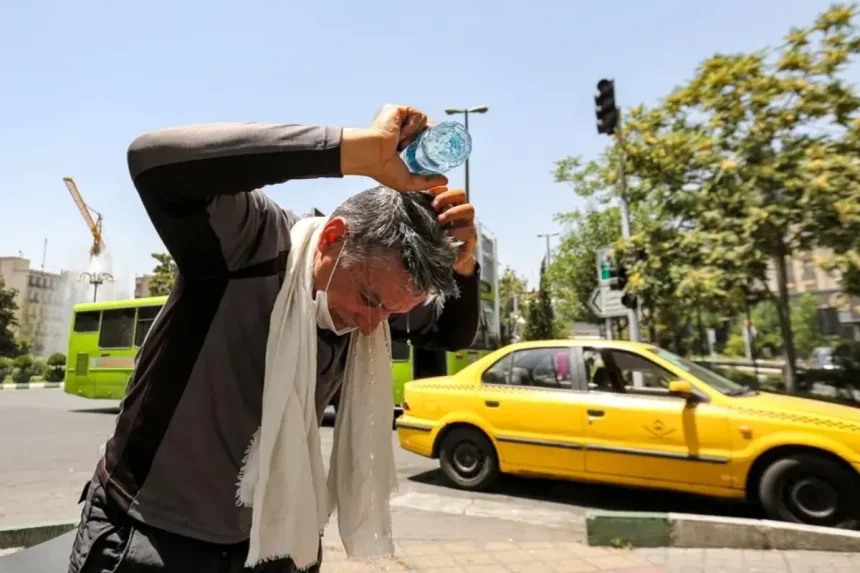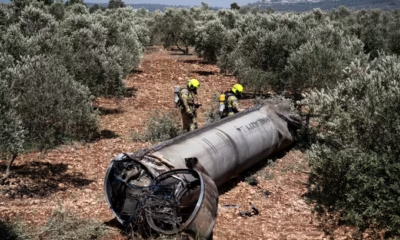Headline
Iran Declares Holiday Amid Scorching Heatwave As Water Crisis Deepens

Iranian authorities have urged citizens to drastically reduce water consumption as the country battles severe shortages triggered by an intense heatwave, with temperatures surpassing 50 degrees Celsius in some parts.
According to the national meteorological service, this is Iran’s hottest week of the year so far, and conditions are expected to worsen. In Tehran, the capital, temperatures hit 40°C (104°F) on Sunday and are forecast to reach 41°C (106°F) by Monday.
Amid the heatwave in Iran and mounting pressure on water and electricity supplies, Tehran province has declared a public holiday on Wednesday. Government spokesperson Fatemeh Mohajerani announced the social media platform X, citing the need for resource conservation.
READ ALSO:Israel Wants Global Action Against Iran’s Nuclear Plans
“In light of the continued extreme heat and the necessity of conserving water and electricity, Wednesday … has been declared a holiday in Tehran province,” she wrote.
Water scarcity has long plagued Iran, especially in its arid southern provinces. The crisis has been attributed to a combination of climate change, mismanagement, and overexploitation of underground water resources. Officials warn that the reservoirs feeding Tehran are now at their lowest levels in a century, after years of declining rainfall.
Tehran city council chair, Mehdi Chamran, called on residents to conserve water to avoid further supply disruptions. Several provinces have issued similar advisories, urging citizens to cut down usage significantly.
READ ALSO:We Would Have Killed Iran’s Supreme Leader If Given Opportunity – Israel
Tehran’s provincial water management company has appealed for a minimum 20 per cent reduction in consumption to help ease the strain. Local reports from Javan, a conservative newspaper, revealed that authorities have already reduced water supplies in parts of the capital, resulting in outages lasting between 12 and 18 hours in some areas.
Energy Minister Abbas Aliabadi, in a statement on Sunday, apologised for the disruptions, explaining that the measure was necessary “to better manage resources.”
The situation adds to the growing list of climate-related challenges facing Iran, raising fresh concerns about long-term sustainability in the face of extreme weather events.
Headline
Trump Warns Of More Strikes In Nigeria If Attacks On Christians Continue

US President Donald Trump has warned that he could authorise additional military strikes in Nigeria if attacks against Christians continue, citing the security situation in the West African nation as a key concern.
In an interview with the New York Times on Thursday, Trump was asked whether the Christmas Day strikes in Sokoto State, which targeted Islamist militants, were intended as part of a broader campaign. “I’d love to make it a one-time strike. But if they continue to kill Christians, it will be a many-time strike,” he said.
READ ALSO:Russia, China Afraid Of US Under My Administration — Trump
Trump’s comments follow his 2025 designation of Nigeria as a “country of particular concern” due to what he described as an “existential threat” to its Christian population. The remarks have drawn criticism from Nigerian officials, who insist that jihadist groups target people regardless of religion. “Muslims, Christians and those of no faith alike” are affected, a government spokesperson said, rejecting claims that Christians are being singled out.
When pressed about reports that most victims of jihadist groups in Nigeria are Muslims, Trump responded, “I think that Muslims are being killed also in Nigeria. But it’s mostly Christians.” Nigeria, with a population exceeding 230 million, is roughly evenly divided between Christians in the south and Muslims in the north.
The December strikes targeted camps run by a jihadist group known as Lakurawa in Sokoto, a largely Muslim region near the border with Niger. Both the US and Nigerian authorities have linked the militants to Islamic State-affiliated groups in the Sahel, although the IS has not formally claimed any association with Lakurawa. Details of casualties from the strikes remain unclear, as neither government has provided official figures.
Nigeria’s Foreign Minister Yusuf Maitama Tuggar said the operation was a “joint effort” and emphasised that it was not motivated by religion. He confirmed that the strikes had the approval of President Bola Tinubu and included
participation by Nigerian armed forces. Addressing the timing of the strikes, Tuggar added that they were unrelated to Christmas, though Trump described them as a “Christmas present”.
Headline
Science Discovers Why Hungry, Broke Men Prefer Bigger Breasts

A scientific study has found that men who feel financially insecure or hungry are more likely to find larger female breasts attractive.
The research was published in the peer-reviewed journal PLOS ONE and was conducted by psychologists Viren Swami and Martin J. Tovée.
The study examined whether breast size acts as a signal of fat reserves and access to resources, and whether men facing resource insecurity rate larger breast sizes as more attractive than men who feel economically secure.
Researchers carried out two separate studies across Malaysia and the United Kingdom.
In the first study, 266 men from three areas in Malaysia were assessed. The locations represented low, medium and high socioeconomic backgrounds. Participants were shown rotating computer-generated images of women with different breast sizes and asked to rate which they found most attractive.
READ ALSO:Wike: Why Removing Fubara Will Be Difficult – Ex-Commissioner
The findings showed a clear socioeconomic pattern.
Men from low-income rural areas preferred larger breasts.
Men from middle-income towns preferred medium to large breasts.
Men from high-income urban areas preferred smaller to medium breasts.
PLOS ONE study showing how hunger and financial insecurity affect men’s breast size preferences
Cover page of a PLOS ONE study examining how resource insecurity influences men’s breast size preferences. Source: PLOS ONE
As stated in the study, “Men from relatively low socioeconomic sites rated larger breast sizes as more physically attractive than did participants in moderate socioeconomic sites, who in turn rated larger breast sizes as more attractive than individuals in a high socioeconomic site.”
READ ALSO:Rare 1937 ‘Hobbit’ Discovered In House Clearance Sells For $57,000
The researchers noted that the lower a man’s financial security, the stronger his preference for larger breast size.
The second study focused on hunger rather than income.
In Britain, 124 male university students were divided into two groups. Sixty-six participants were classified as hungry, while 58 had recently eaten. Both groups viewed the same breast size images under identical conditions.
Hungry men consistently rated larger breasts as more attractive than men who were full.
READ ALSO:‘I Discovered My Husband Was Sterile 5 Yrs After We Got Married’
According to the researchers, “Hungry men rated a significantly larger breast size as more physically attractive than did the satiated group. Taken together, these studies provide evidence that resource security impacts upon men’s attractiveness ratings based on women’s breast size.”
The researchers explained that these shifts suggest attraction is not fixed but responsive to immediate conditions.
They noted that men experiencing hunger or financial pressure may place greater value on physical traits that signal access to resources or stability.
The study added that temporary states such as hunger can shape attraction in the same way long-term economic conditions do, reinforcing the idea that social and environmental factors play a key role in how physical attractiveness is judged.
Headline
Man With Lengthy Criminal Record Shoots Nigerian To Death Inside Bus In Canada

A 40-year-old man with an extensive criminal history has been charged with first-degree murder after a Nigerian national was shot dead on a GO bus at the Yorkdale GO Bus Terminal in Toronto, marking the city’s first homicide of 2026.
Toronto Police, in a statement on their website, said officers were called to the terminal, near Yorkdale Road and Allen Road, at about 7 p.m. on Sunday, January 4, following reports of a shooting. Investigators allege that both the suspect and the victim boarded a GO bus at the terminal, where the suspect shot the victim before fleeing the scene on foot.
According to the statement, officers arrived to find a man suffering from a gunshot wound, but despite carrying out life-saving measures, the Nigerian was pronounced dead at the scene.
The victim was later identified as Osemwengie Irorere, a 46-year-old man from Nigeria, the Toronto police said in a later statement.
READ ALSO:Canada Flags Nigeria, 16 African Countries As High-risk In New Travel Advisory
Local media reports noted that an eyewitness who was seated just behind the victim said the bus had been dark and crowded as passengers waited to depart when a single gunshot rang out.
“I assumed it was a popped tyre or something, but immediately after, a guy sitting in front of me got up, shoved his hands in his pocket and ran off the bus,” the witness said, requesting anonymity for safety reasons.
“Right after, I stood up and I looked at the seat in front of me and I saw a guy, bleeding,” he added, saying he could smell smoke in the air after the shot was fired.
Police said the suspect was located and arrested a short time later near the Yorkdale subway station, and a firearm was recovered.
READ ALSO:Nigerian Musician Dies In Canada
The accused has been identified as Tyrel Gibson, 40, of Toronto. He appeared at the Toronto Regional Bail Centre on Monday, January 5.
Court documents show that Gibson has a lengthy criminal record dating back to 2000, with nearly two dozen charges. He has previously been convicted of offences including attempted murder and firearm-related crimes. In 2015, he pleaded guilty to aggravated assault, using a firearm, possession of a firearm with ammunition and possession of an unauthorised firearm and was handed a lifetime weapons prohibition. He was sentenced to eight years in prison in 2017, although it remains unclear how much of that term he served.

 News4 days ago
News4 days agoHow To Calculate Your Taxable Income

 Metro4 days ago
Metro4 days agoEdo widow-lawyer Diabolically Blinded Over Contract Seeks Okpebholo’s Intervention

 News3 days ago
News3 days agoExpert Identify Foods That Increase Hypertension Medication’s Effectiveness

 Headline4 days ago
Headline4 days agoRussia Deploys Navy To Guard Venezuelan Oil Tanker Chased By US In Atlantic

 Politics3 days ago
Politics3 days agoAPC Leaders, Tinubu/Shettima Group Call For Wike’s Removal As FCT Minister

 Entertainment4 days ago
Entertainment4 days agoVIDEO: ‘Baba Oko Bournvita,’ Portable Drags His Father, Alleges Bad Parenting, Extortion

 Metro4 days ago
Metro4 days agoJUST IN: Court Grants Malami, Wife, Son N500m Bail Each

 Politics4 days ago
Politics4 days ago2027: Details Of PDP Leaders, Jonathan’s Meeting Emerge

 Headline2 days ago
Headline2 days agoScience Discovers Why Hungry, Broke Men Prefer Bigger Breasts

 Politics3 days ago
Politics3 days agoWike A ‘Pestilence’ On Rivers, I Resigned Because Of It – Ex-Commissioner




























